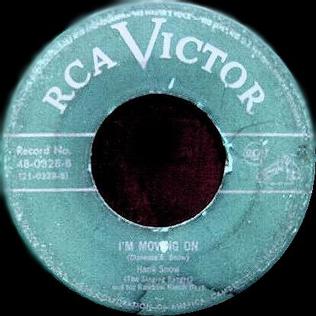"I'm Moving On" is a 1950 country standard written by Hank Snow. It was a success in the record charts and has been recorded by numerous musicians in a variety of styles.
| "I'm Moving On" | ||||
|---|---|---|---|---|
 | ||||
| Single by Hank Snow (The Singing Ranger) and His Rainbow Ranch Boys[1] | ||||
| A-side | "With This Ring, I Thee Wed"[2] | |||
| Released | May 5, 1950[2] | |||
| Recorded | March 28, 1950[1] | |||
| Studio | Brown Radio Productions, Nashville, Tennessee[1] | |||
| Genre | ||||
| Label | RCA Victor[2] | |||
| Songwriter(s) | Clarence E. Snow a.k.a. Hank Snow | |||
| Producer(s) | Stephen Sholes | |||
| Hank Snow (The Singing Ranger) and His Rainbow Ranch Boys[1] singles chronology | ||||
| ||||
Recording and lyrics
editAccording to Snow, he proposed the song for his first session for RCA Records in 1949, but recording director Stephen H. Sholes turned it down. "Later on, in the spring of 1950, in Nashville, Mr. Sholes had not remembered the song, so I recorded it," Snow recalled.[3]
The song has four bars of verse followed by eight bars of chorus with the final lines referring back to the verse:
That big eight-wheeler rollin' down the track
Means your true-lovin' daddy ain't comin' back
'Cause I'm movin' on, I'll soon be gone
You were flyin' too high for my little old sky so I'm movin' on
Charts and critical reception
editThe single reached number one on the Billboard country singles chart and stayed there for 21 weeks, tying a record for the most weeks atop the chart.[4] It was the first of seven number-one Billboard country hits Snow scored throughout his career on that chart.[4] The song's success led to Snow joining the Grand Ole Opry cast in 1950.[5]
According to music writer John Morthland, "The chugging beat establishes that this is a train song, and the fiddle and steel push harder than is usual on Nashville records from this era ... There's real anger and determination in Snow's voice, which sometimes sounds too smooth for this type of song."[6]
Charting versions
edit- Ray Charles – In 1959, a version by Ray Charles reached number forty on the Billboard Hot 100 singles chart and number eleven on the R&B singles chart. Charles's version with his soul band featured congas and maracas, giving the Spanish tinge to a country and western blues. It was recorded on June 26, 1959, at his last recording session with Atlantic Records,[7] months before he signed with ABC. Produced by Jerry Wexler, Charles provides the lead vocals, and is backed by the Raelettes. The Ray Charles Orchestra provided the instrumentation.
- Don Gibson – reached No. 14 on the Billboard Hot Country Singles chart with a recording of the song in 1960.[4]
- Matt Lucas – In June 1963, his Smash Records single reached No. 56 on the Hot 100.[8]
- The Rolling Stones recorded the song for their EP Got Live If You Want It! in 1965. Their version charted in Sweden, reaching No. 3 on Tio i Topp and No. 7 on Kvällstoppen.[9][10]
- Emmylou Harris – Released an up-tempo live version on her album Last Date in 1982, which reached No. 5 on the Hot Country Singles chart.[4]
Other recordings
edit- Les Paul and Mary Ford – Les and Mary (1955)[11]
- Elvis Presley recorded and released a version in 1969, which was included on his album From Elvis in Memphis[12]
References
edit- ^ a b c "Victor matrix E0VB-4045. I'm moving on / Rainbow Ranch Boys; Hank Snow". Discography of American Historical Recordings. Retrieved September 29, 2022.
- ^ a b c "Victor 21-0328 (10-in. double-faced)". Discography of American Historical Recordings. Retrieved September 29, 2022.
- ^ Horstman, Dorothy (1975). Sing Your Heart Out, Country Boy (Third ed.). Country Music Foundation Press. p. 365. ISBN 0-915608-19-7.
- ^ a b c d Joel Whitburn, Joel Whitburn's Top Country Songs 1944 to 2005, Record Research, 2005
- ^ Malone, Bill C. (1968). Country Music U.S.A. (1985 paperback ed.). University of Texas Press. p. 238. ISBN 0-292-71096-8.
- ^ Morthland, John (1984). The Best of Country Music (First ed.). Doubleday Dolphin. p. 208. ISBN 0-385-19192-8.
- ^ Simons, Dave (2004). Studio Stories: How the Great New York Records Were Made: From Miles. New York: Backbeat Books. p. 72. ISBN 9781617745164. Retrieved April 14, 2021.
- ^ Whitburn, Joel (2013). Joel Whitburn's Top Pop Singles, 14th Edition: 1955-2012. Record Research. p. 519.
- ^ Hallberg, Eric; Henningsson, Ulf (1998). Eric Hallberg, Ulf Henningsson presenterar Tio i topp med de utslagna på försök: 1961 - 74. Premium Publishing. p. 313. ISBN 919727125X.
- ^ Hallberg, Eric (1993). Eric Hallberg presenterar Kvällstoppen i P 3: Sveriges radios topplista över veckans 20 mest sålda skivor 10. 7. 1962 - 19. 8. 1975. Drift Musik. ISBN 9163021404.
- ^ "www.allmusic.com". www.allmusic.com. Retrieved July 1, 2024.
- ^ Perone, James 2012, p. 221.
- Perone, James (2012). The Album: A Guide to Pop Music's Most Provocative, Influential, and Important Creations. Vol. 1. ABC-Clio. ISBN 978-0-313-37906-2.